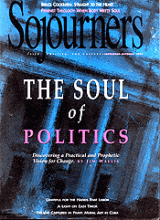At first glance, Martha Bayles looks like the enemy. For six years a critic for The Wall Street Journal, Bayles has also written for conservative publications like the Brookings Review and the New Criterion. With those credentials youd expect her book, Hole in Our Soul: The Loss of Beauty and Meaning in American Popular Music, to be an austere right-wing polemic about how pop music is responsible for everything from crack babies to post-nasal drip.
But Bayles is on to something, and you dont have to be Bill Bennett to appreciate her passion and the breadth of her scholarship. "The central argument of Hole in Our Soul is that the anarchistic, nihilistic impulses of perverse modernism have grafted onto popular music," she writes, "where they have not only undermined the Afro-American tradition, but also encouraged todays cult of obscenity, brutality, and sonic abuse."
By "perverse modernism" Bayles refers to the strain of "anti-art" that has its origins in the poet Rimbaudwho rejected his own poetry as "absurd"as well as futurism, Marxism, and the early 20th-century dadaist who held artistic standards in contempt. These groups viewed art itselfwith the exception of their own negations, of courseas "bourgeois" exercise ripe for parody and deconstruction.
According to Bayles, in the 1960s such thinking was popular among the students in the British art schools. When the students discovered American bluesmusic whose mass appeal, structured format, and commercial viability were at odds with the anarchic indulgence of perverse modernismthey turned the soulful heritage of African-American music (a history Bayles expertly documents from the drum rhythms of Africa to rap) into a sneering cultural stance:
Read the Full Article
